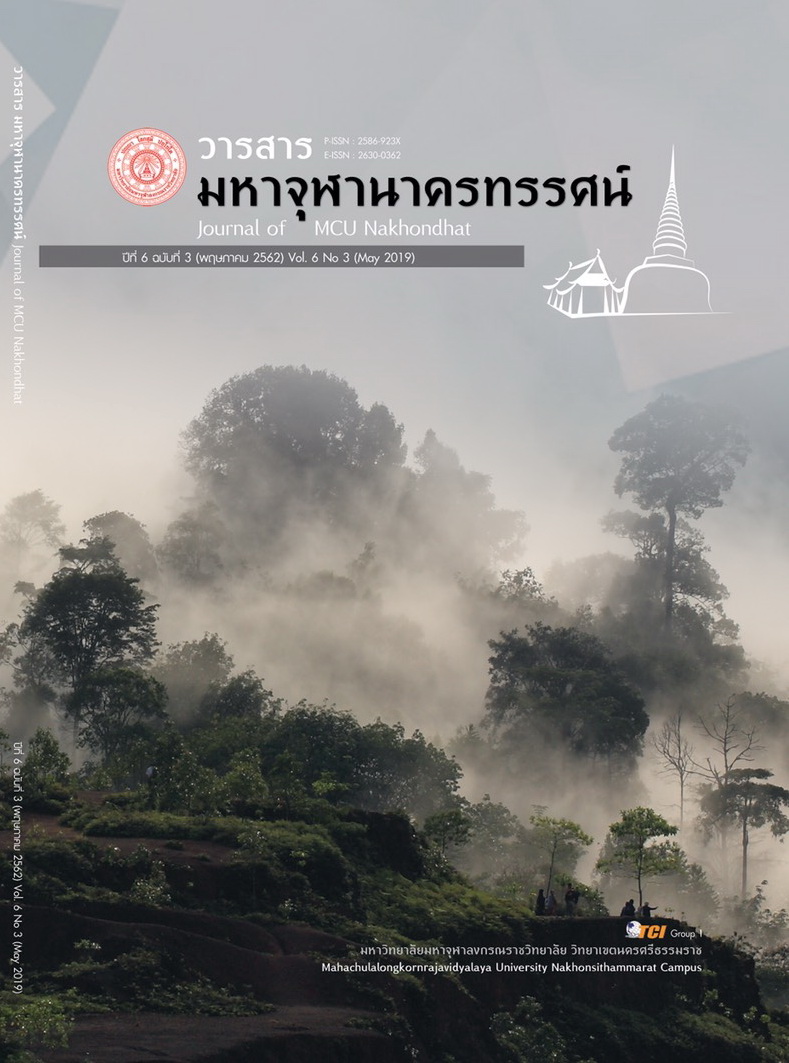THE RECONSTRUCTION OF YOUTH TRAINING MANAGEMENT FOR MORAL CAMP THROUGH THE BUDDHIST PHILOSOPHY.
Main Article Content
Abstract
The objectives of this research were: 1) to study the condition of youth training camp in the area of Nakhon Si Thammarat. 2) To study the Buddhist philosophy on the management of youth camps moral camp. 3) to apply Buddhist philosophy as a guideline to solve problems and to reconstruct of youth training management for moral camp at Nakhon Si Thammarat province and 4) to create new body of knowledge and model of youth training camp moral. This study is the qualitative research by methodology in dialectical method and also using the discursive reason under the process of analytic, appreciative and applicative approaches. The samples were camp at Nakhon Si Thammarat province 5 group were 1) camp director 2) trainer monk 3) teacher 4) youth and 5) parent or people. The instruments were in-depth interviewer and questionnaire this research create effective model of youth training in the Philosophical and Religions field.
The results of research are found as follows:
- The problem of youth moral camp at Nakhon Si Thammarat province such as 1) courses problem 2) staff problem 3) corporations of home /temple/ school problem 4) training process problem 5) media and technology problem and 6) evaluation and follow up problem.
- According to Buddhist philosophy study that useful for youth moral camp such as Buddhist metaphysics, for example, five aggregates and three characteristics of existence, epistemology such as three wisdoms and ten Kalama Sutta and the last one Buddhist ethics such as five precepts, ten wholesome course of action, Eightfold Path, threefold training, Bhavana4 and four strengths.
- To apply Buddhist philosophy as a guideline in solving the problems and reconstructing of youth training management for moral camp at Nakhon Si Thammarat province, for example, five aggregates, three characteristics of existence and four strengths.
- Creative new body of knowledge by including the use of religious dimension for moral course students not only learning how to use them mind to know morality but also how to survive from media technology in the globalization, high competition and scrambled period so after youth finish the course they will be a good citizen for developing society in the future. On the other hand, major research findings indicated that the lecturers learn about how to be good teamwork by brainstorm to overcome and eliminate the problem together, using knowledge process applied to all work at full potential.
Article Details
References
ยืน ภู่วรรณ และสมชาย นำประเสริฐชัย. (2546). ไอซีทีเพื่อการศึกษา (พิมพ์ครั้งที่ 2). กรุงเทพมหานคร: ซีเอ็ดยูเคชั่น.
พระไพศาล วิสาโล. (2549). สุขภาพสังคม: ความขัดแย้ง ความรุนแรงกับระบบบริการสุขภาพ. นนทบุรี: สำนักวิจัยสังคมและสุขภาพ.
พุทธทาสภิกขุ. (2543). ค่ายธรรมบุตร (พิมพ์ครั้งที่ 2). กรุงเทพมหานคร: ธรรมทานมูลนิธิ.
วงศถิตย์ วิสุภี. (2550). ค่ายคุณธรรมจริยธรรม: รูปแบบการจัดการที่เหมาะสมสำหรับเยาวชนภาคตะวันออกเฉียงเหนือเขตการปกครองคณะสงฆ์ภาค 9. ใน ปริญญาดุษฎีบัณฑิต สาขาวัฒนธรรมศาสตร์. บัณฑิตวิทยาลัย มหาวิทยาลัยมหาสารคาม.
พระมหานภดล สุวณฺณเมธี (มีคำเหลือง). (2550). การศึกษาผลสัมฤทธิ์ของการฝึกอบรมเยาวชนของค่ายคุณธรรมวัดบรรพสถิต จังหวัดลำปาง . ใน วิทยานิพนธ์พุทธศาสตรมหาบัณฑิต. บัณฑิตวิทยาลัย มหาวิทยาลัยมหาจุฬาลงกรณราชวิทยาลัย.


